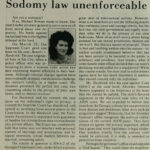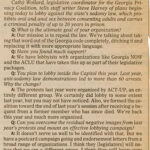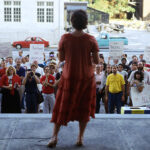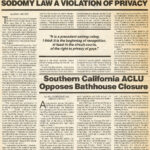Bowers v. Hardwick
On March 31, 1986, Michael Hardwick was charged with violating Georgia’s anti-sodomy law. Although prosecutors decided not to move forward with the case, Hardwick sued the Federal District Court, requesting that the law be declared unconstitutional. While the Eleventh Circuit Court of Appeals agreed that the law violated the Ninth and Fourteenth Amendments, the U.S. Supreme Court reversed the ruling, concluding that there was no fundamental right to sodomy.
While the Georgia sodomy statute was struck down in 1998, Bowers v. Hardwick was not overturned until 2003, in Lawrence v. Texas.
- On July 3, 1986, Hardwick and his attorney, Kathy Wilde spoke at a demonstration at the Richard B. Russell Federal Building.
- On July 27, members of NAPWA marched to the Georgia Capitol.
- During the 1987 March on Washington, over 600 activists, including Atlantans Maria Helena Dolan and Ray Kluka were arrested at the U.S. Supreme Court for acts of civil disobedience as they protested the Hardwick decision.
- On January 8, 1991, as part of a two-day protest, national and local ACT UP members led a demonstration at the Georgia Capitol and Woodruff Park.
“These were the days that, while the opponents would say that sodomy laws really didn’t hurt people’s lives, the sodomy laws here in Georgia, and other states that had them, were used very much to block HIV prevention messages. There would be legislation that would pass that would say things like, “you can educate young people on how to prevent HIV, as long as you are not promoting any illegal behavior,” which was, of course, a backroom way of saying you can’t talk about homosexuality. And so, the sodomy law was a big focus of the activism.”
Jeff Graham, August 8, 2014







